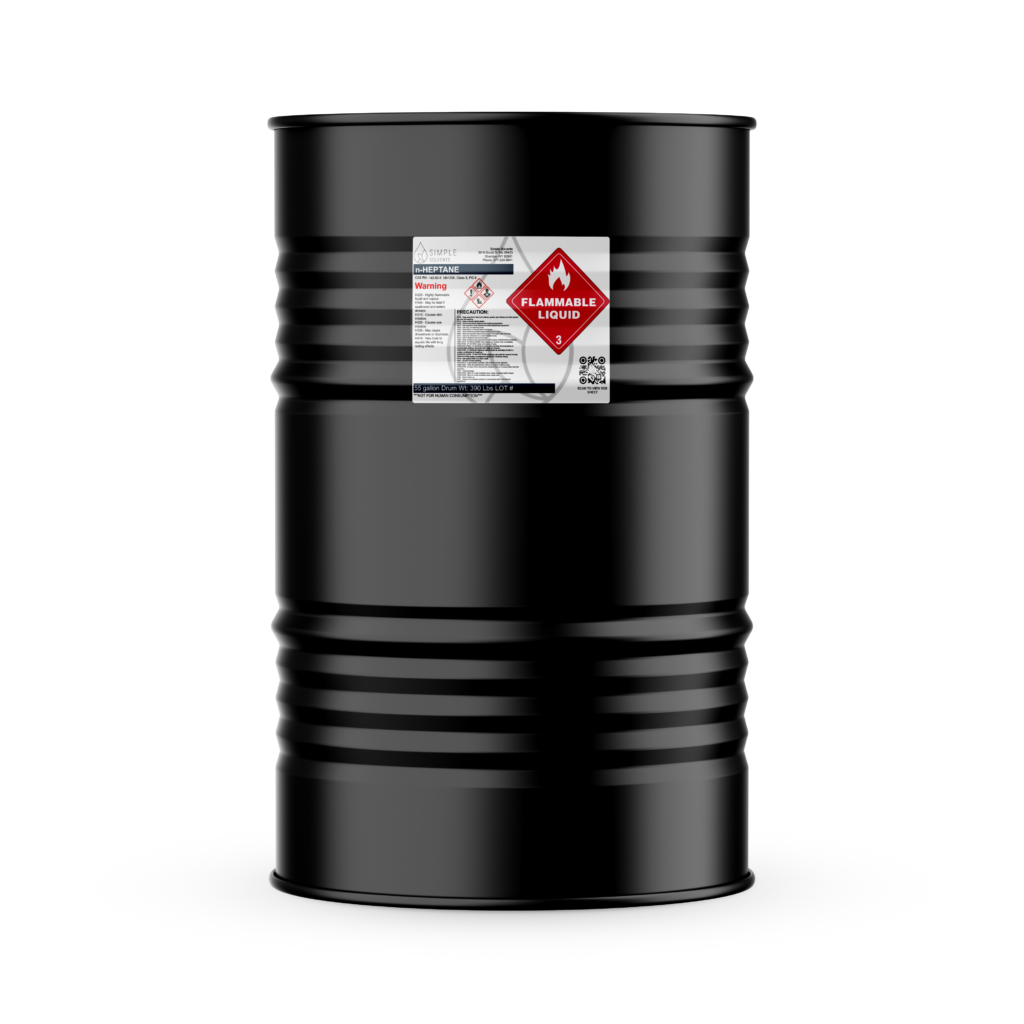Heptane Vs. N-Heptane: How Are They Different?

Heptane Vs. N-Heptane: How Are They Different?
Heptane Vs. N-Heptane: The breakdown.
Heptane has nine isomers including N-heptane,2 methyl hexane,2,2-dimethyl pentane,2,3-dimethyl pentane,2,4-dimethyl pentane,3,3-dimethyl pentane,3-ethyl pentane and 2,2,3-trimethyl butane.
This article aims to establish the difference between Heptane vs. N-heptane and explore their various uses in the chemical industry. The toxicity values for heptane and n-heptane are both high, and additional information can be found in this EPA Peer-Reviewed article.
What Is Heptane?
Heptane is a colorless liquid and one of the components of gasoline. It is a straight-chain alkane with seven carbon and 16 hydrogen atoms arranged in branched or unbranched molecules. Thus, it has a C7H16 chemical formula. Heptane is a liquid at room temperature, highly flammable, and low boiling point. In addition, it’s less toxic and evaporates slowly.
What Are The Uses Of Heptane?
Heptane is used as a non-polar solvent in many industrial operations and is the standard for octane rating in many gasoline pumps worldwide. Due to its high flammability, Heptane is used as a fuel. It’s particularly useful in outdoor camping stoves because of its hydrocarbon nature that produces massive energy during combustion.
Heptane is also used as a thinner for rubber cement and in the laboratory as a reagent. Furthermore, law enforcement agencies use it to process fingerprints. It’s also used in manufacturing industries to manufacture ink. Finally, extraction industries use Heptane as a cheaper and more environmentally friendly alternative in vegetable oil extraction.
Role Of Heptane In The Fuel Industry
Pure Heptane is zero-rated on the octane scale. Thus, it determines the octane rating in fuel pumps worldwide. Octane rating measures the fuel’s ability to resist engine knocking when highly compressed. Therefore, a higher octane rating means a better fuel than a lower octane rating. Besides, Heptane is a petroleum derivative and one of the components of gasoline.
What Is N-Heptane?
Also known as normal Heptane, N-Heptane is a pure form of Heptane and the unbranched structure of the heptane molecule. It’s a colorless, flammable liquid with a 98.4 degrees boiling point. It’s almost insoluble in water but slightly soluble in alcohol, ether, and chloroform.
Uses Of N-Heptane
N-heptane is the purest form of Heptane. Thus, it is used in pharmaceutical industries and certain laboratories that require pure and precise identification of chemical reactions. Like Heptane, it is used as a standard for determining the octane rating for engine fuels. However, n-Hexane has a zero octane rating, meaning that it can’t make good fuel for engines.
Normal Heptane is also used in manufacturing to synthesize rubber and pesticides. Additionally, you can use it as a solvent for various industrial processes, a chemical reagent in laboratories, and cleaning electronics. Besides, it is used in anti-knock engine tests and chromatographic analysis as a standard material.

Role Of N-Heptane In The Fuel Industry
N-Heptane is lighter than gasoline and is zero-rated on the octane scale. As a result, it burns more explosively, resulting in engine knocking. On the other hand, other octane isomers burn slowly, resulting in less engine knocking. Due to its high purity, N-Heptane makes the best choice of octane scale determinant.
What Are The Similarities And Differences Between Heptane And N-Heptane?
Heptane vs. n-Heptane, is an organic compound with seven carbon atoms and 16 hydrogen atoms in branched or unbranched structures. The term ‘heptane’ describes all the isomers of Heptane. On the other hand, N-heptane is the pure and unbranched structure of the heptane molecule and the most useful of the eight isomers.
Both molecules have various uses in manufacturing industries. For instance, both are used as solvents in vegetable oil extraction, fuel in camping stoves, laboratory reagents, and fingerprint processing.
However, n-Heptane is pure and used in pharmaceutical industries and laboratories that require precise control of chemical variables. In addition, n-Heptane has a zero rating on the octane scale and determines engine fuel quality.
Conclusion
Heptane is an organic compound with seven carbon atoms and 16 hydrogen atoms in branched or unbranched molecules. It has eight isomers, with N-heptane being the purest and unbranched form of the molecule.
Thus, it makes an excellent choice in pharmaceutical laboratories requiring precise control of chemical variables. Both molecules are used as solvents in various industrial processes, including manufacturing and extraction industries. N-heptane is zero-rated in the octane scale and is used to determine the octane rating of engine fuels.
